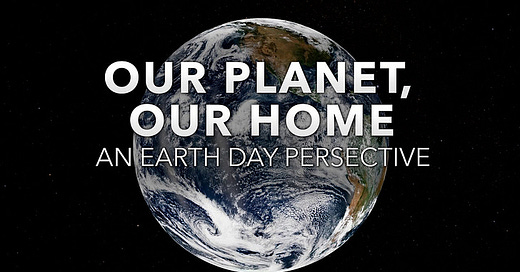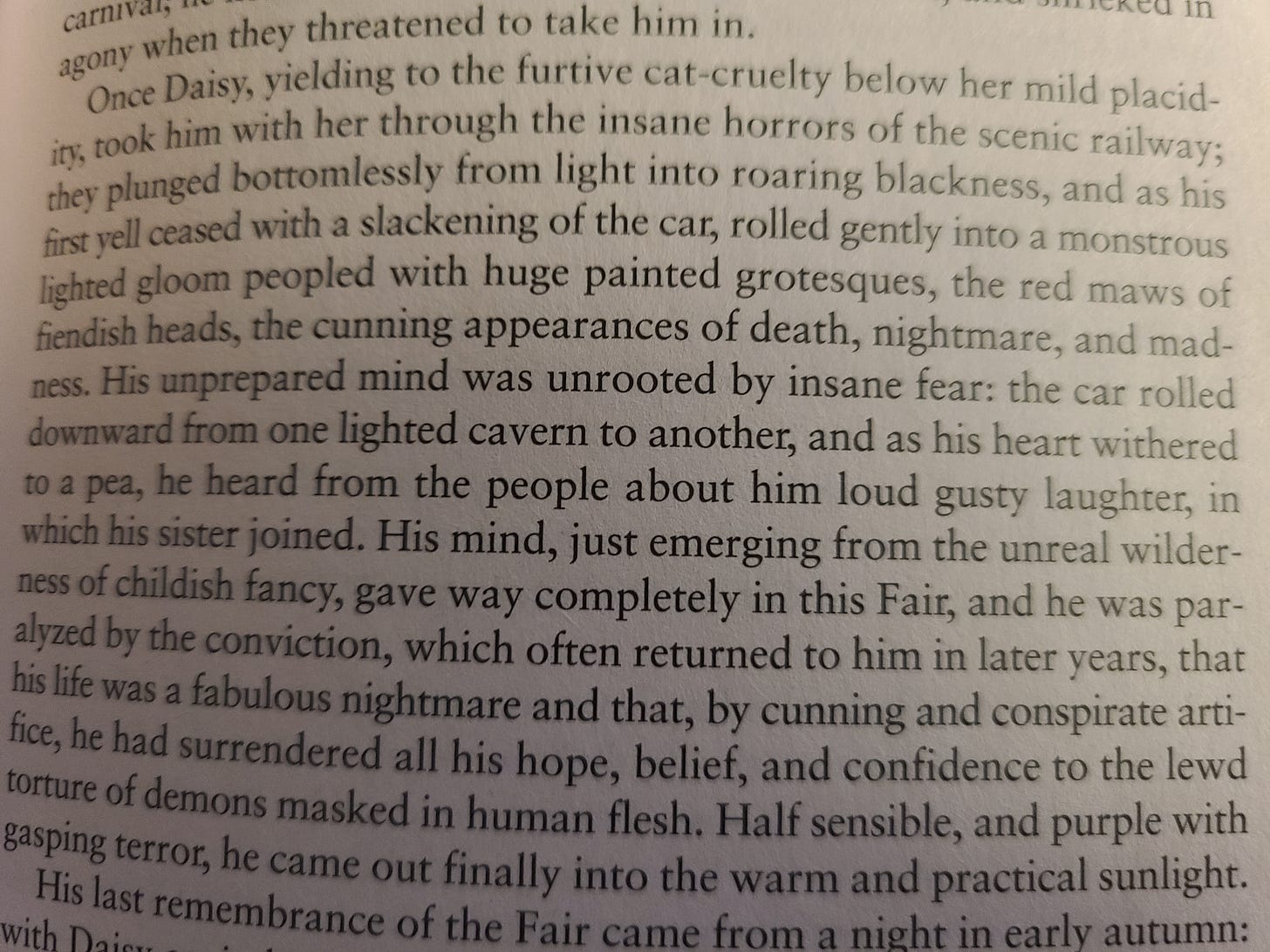The Overview - May 10, 2021
The Overview is a weekly roundup of eclectic content in-between essay newsletters & "Conversations" podcast episodes to scratch your brain's curiosity itch.
Hello Eclectic Spacewalkers,
I wish that you and your family are safe and healthy wherever you are in the world. :)
Check out the last The Overview - May 03, 2021: HERE
Get our E-Book for free by using ‘substack’: HERE
—
Below are some eclectic links for the week of May 10th, 2021.
Enjoy, share, and subscribe!
Table of Contents:
Articles/Essays - The Guardian; International Journal of Communication; Wall Street Window; Project Reboot; The Convivial Society; Law & Political Economy Project; Lamphams Quarterly; Logic Magazine; Real Life Magazine; Expanding Awareness
Book - Look Homeward, Angel by Thomas Wolfe
Documentary - Fact vs. fake – why don’t we trust science anymore? | @dwnews
Lecture - Ecological Economics course via @DrDanONeill
Paper - Epistemic Collaborativeness as an Intellectual Virtue via @AlkisKotsonis
Podcasts - #17 @jdj_writes On The Shift From Planetary Crisis to Planetary via @Joe_Lightfoot_; Jean Gebser's Ever Present Origin, with @jdj_writes & @JulesEvans11 via @WisdomRebel
TED Talk - In the war for information, will quantum computers defeat cryptographers? | Craig Costello
Twittersphere - With the help of masters students here in Leicester, we've been playing with @NASAHubble observations to investigate seasonal changes on #Uranus - here's a rough animation of a quarter-century of 619-nm images from 1995 to 2020 from the public archive (Credit: NASA/ESA)
Videos - Our Planet, Our Home┃An Earth Day Perspective via @NASA; HomeWorld - A Meditation on Planet Earth via @_TheSeaning
Website - Announcing the Creative Good community via @markhurst
Articles/Essays
‘We are witnessing a crime against humanity’: Arundhati Roy on India’s Covid catastrophe via @guardian
“It’s hard to convey the full depth and range of the trauma, the chaos and the indignity that people are being subjected to. Meanwhile, Modi and his allies are telling us not to complain...
So here we are now, in the hell of their collective making, with every independent institution essential to the functioning of a democracy compromised and hollowed out, and a virus that is out of control...
The crisis-generating machine that we call our government is incapable of leading us out of this disaster. Not least because one man makes all the decisions in this government, and that man is dangerous – and not very bright. This virus is an international problem. To deal with it, decision-making, at least on the control and administration of the pandemic, will need to pass into the hands of some sort of non-partisan body consisting of members of the ruling party, members of the opposition, and health and public policy experts.”
—
Technofutures in Stasis: Smart Machines, Ubiquitous Computing, and the Future That Keeps Coming Back via @sunhahong in @Journal_Of_Comm
“Technoculture promises eternal novelty, but it is often the same old future that keeps coming back. This article argues that the systemic repetition of imagined technofutures often sustains stagnant imaginaries of social relations embedded in those futures. Recycled visions of the smart office or the robot vacuum cleaner carry with them normative assumptions about relations of labor and gender, home and family, that are sheltered from scrutiny through the language of innovative “disruptions.” Drawing on archival research, I analyze the imagined futures of ubiquitous computing (“ubicomp”) in the 1990s, and their resonances in the popularization of “smart” machines today. Ubicomp’s signature promise of disappearing computers rested on a familiar conflation of individualized convenience with freedom—a view of breathless innovation underwritten by a static, ossified imagination of domestic labor or the white-collar office. Such mythmaking reproduces a persistent pattern of one-dimensional thought, in which asymmetric power relations and perverse economic incentives for data surveillance are systematically excluded from the drawing board.”
Summarized Twitter Thread:


—
The Age of Over-Abundant Elites – Mark Jeftovic (H/T: @nils_gilman)
“The coming Climate Emergency will embark on some fool’s errand like “15 months to cool 1.5C”, and it will probably be announced from some Davos-style ecological summit on Richard Branson’s private island that all the participants arrived at via super-yachts.
Because as per Turchin, this is final stage that transitions us into a period of chaos and instability:
‘First, the elites become accustomed to ever greater levels of consumption. Furthermore, competition for social status fuels “conspicuous consumption” (Veblen 1973 [1899]). Thus, the minimum level of consumption necessary for maintaining the elite status exhibits runaway growth. Second, the numbers of elites, in relation to the rest of the population, increase.
The third consequence is that the twin processes of declining living standards for the commoners and increasing consumption levels for the elites will drive up socioeconomic inequality. As a result of the growth in elite appetites and numbers, the proportion of the total economic pie consumed by them will increase. However, there are limits on how far this process can go. Eventually, increasing numbers of elites and elite aspirants will have to translate into declining consumption levels for some, leading to the condition that has been termed elite overproduction (this is reminiscent of population growth leading to overpopulation). Intraelite competition for limited elite positions in the economy and government will become more fierce.”
—
The Infrastructural Power Beneath the Internet as We Know It via @lifewinning in @ProjectReboot
“Control over underlying tech infrastructure determines who benefits from it, raising the prospect of alternative ownership and profit models.
The negative impacts of platform centralization on the public don’t directly result from holding the means of computation: having a lot of data centers has no correlation with spreading misinformation or enabling hate speech and online harassment beyond allowing such activities to scale. But a monopoly on the means of computation adds to the inertia that makes leaving said platforms challenging. Even if there’s an alternative platform with better safeguards against harassment, why go to a platform where I have to pay for storage, or where fewer of my friends are, or that’s occasionally offline because it’s actually just a single Mastodon instance run by one person?”
—
The Answer Is Not More Information via @LMSacasas
“Moreover, if we do proceed, as we often must, without the benefit of certainty, venturing forth and assuming the real risks that must accompany our action in this world—especially once we renounce the imperative to control, manage, and master—then it would be a far better thing to do so in the affectionate and heartening company of friends who will sustain us in our failures and celebrate our triumphs. After all, it is easier by far to take a step into the unknown with another walking alongside of us than it is to do so alone. If I must bear the consequences of my choices alone, if there is no one whose counsel I trust, then it becomes especially tempting to seek both perfect knowledge and certainty before acting, and find myself paralyzed in their absence.
Unfortunately, the patterns of our techno-social order tend toward the fracturing of community and the isolation of the person. We are offered an array of tools that promise to assuage the resulting economic and psychic precarity, but, more often than not, their real aim implicit in their design is to perpetuate and accelerate social fragmentation and cultivate deeper degrees of dependency from users. They tend to inhibit the enduring satisfaction of our genuine needs in order to perpetuate our dependence on their services. They distract us from attending to the roots of our disorders in order to continue trading on the superficial and counterproductive “solutions.””
—
Ferment is Abroad: Techlash, Legal Institutions, and the Limits of Lawfulness via @salome_viljoen_ in @LPE_Project
“Technological and legal institutions are facing twin moments of reckoning.
On the one hand, we have the “techlash.” Over the past several years, enthusiasm for Silicon Valley’s California Ideology as a source of hope and vigor for the Western capitalist imaginary has begun to fade. No longer does the tech industry enjoy unquestioned goodwill and enthusiastic popular support for their narratives of technological determinism and profitable do-goodery. On the contrary, the industry has been the focus of increased public distrust, civil and worker activism, and regulatory scrutiny—a collective curdling of goodwill referred to as the “techlash.” There is a growing recognition that technology is deeply political and a growing distrust of the neoliberal politics our current political economy of technological innovation materializes.”
—
Fusion & Magic via @ajblum in @laphamsquart
“Technology has created marvels that become everyday. Could that save us soon?
But what’s startling to me is that, as implausible as it sounds, transcendent, magical inventions have happened before. Fusion has always emitted the peculiar energy of magical thinking, even stranger as it gets closer to reality. What happens when the magical becomes real? When people fly through the air, when books light up with infinite knowledge, when energy is limitless? At the least there is hope in this space of possibility—this wide gap where reality and fantasy join. It is an abiding thrill of technology that there are moments when it asks us to look away from its externalities—from the conflict minerals, the emissions, the noise, the ad-supported models that suck our attention, destroy the livelihood of culture producers, and warp politics—and toward a miraculous, or just plain livable, future.
We are living on the knife edge of all that now. Will the vaccines beat the virus? Will the technological alternatives to fossil fuels come fast enough to limit the suffering—and perhaps the ultimate apocalypse—of climate change? The promise of technology is the possibility of all its little innovations, those miracles that become commonplace, to amount to the grand magic of ongoing life on earth.”
—
What Green Costs via @triofrancos in @logic_magazine
“The corollary is that force from below can obstruct and even reshape global flows. This force is particularly effective when exercised at “chokepoints”: points of obligatory passage for people and goods. In addition to the factory floor itself, the infrastructure of logistics (ports, ships, warehouses) and the sites of extraction (mines, rigs, refineries) are potential bottlenecks, and thus nodes of vulnerability for the system as a whole. In other words, they are strategic sites for disruption.
I might not know the exact shape of the world I want. The present weighs heavily and makes imagination difficult. But I know it starts with relating to this planet’s bounty as mysterious, vital, and nourishing; envisioning abundance as shared flourishing; and broadening our solidarities to encompass people we may never meet and places we may never visit but whose futures are bound up with our own. The salar will thank us.”
—
Appropriate Measures via @jackiebrownTO in @_reallifemag
“Changing the tech we use is not enough to mitigate the environmental and social harm of mass technology
While successful in some cases, such endeavors highlight a disconnect between appropriate technology and emancipatory politics. Schumacher makes no mention of why communities in the Global South found themselves in need of such solutions in the first place — namely as a result of the extractive and oppressive forces of colonialism. High standards of living in parts of the Western world are in many ways dependent on the exploitation of labor and natural resources in the Global South, and are therefore threatened by efforts to organize self-supporting economies in those countries. Even appropriate technology, based on actively promoting such pursuits, maintains an implicit bias of Western superiority. Many appropriate technology projects (though certainly not all) involve people from the Global North designing for rather than with recipient communities.
Appropriate technology without an appropriate political lens can simply result in technocratic solutionism in another form. Historian Andrew Kirk observes that early versions of the Whole Earth Catalog “promoted radically detached self-sufficiency as the key to a viable revolutionary politics.” The idealism driving the appropriate technology movement “often failed to account for the degree to which even small-scale and individualistic ideas, such as the personal computer, could very rapidly be incorporated into and even strengthen the very systems they were designed to subvert.” Fred Turner addresses this concern in his 2006 book From Counterculture to Cyberculture, pointing in particular to critics of the catalog’s “politically neutral” stance. They argued that the refusal to acknowledge implicit norms entrenched in their utopian worldview ensured that the magazine catered primarily to white, well-educated men — while remaining silent on issues of race, gender, and class.”
—
Get “unstuck” with the Alexander Technique via @m_ashcroft
“Alexander Technique is a way to notice when you're about to get stuck (to 'collapse your possibility space') and then consciously navigate around getting stuck or get unstuck whenever necessary.
Getting unstuck means to become available to everything within the larger possibility space. This is something that happens over and over again — it is never done, and to think that it can be is a trap that itself gets you stuck.
In an intellectual capacity this means repeatedly asserting that you might be incorrect and so being available to change your mind whenever you want. This doesn't mean being pushed around by whatever arguments you come across. You can be very clear in your belief that you are right while at the same time remaining totally okay with the idea that you're not. This is what gives you freedom to make new choices or change your position at any moment.”
Book
Look Homeward, Angel by Thomas Wolfe
“Look Homeward, Angel: A Story of the Buried Life is a 1929 novel by Thomas Wolfe. It is Wolfe's first novel, and is considered a highly autobiographical American Bildungsroman. The character of Eugene Gant is generally believed to be a depiction of Wolfe himself. The novel covers the span of time from Gant's birth to the age of 19. The setting is the fictional town and state of Altamont, Catawba, a fictionalization of his home town, Asheville, North Carolina. Playwright Ketti Frings wrote a theatrical adaptation of Wolfe's work in a 1957 play of the same title.”
Documentary
Fact vs. fake – why don’t we trust science any more? | @dwnews
“Asbestos, climate change, 5G, coronavirus - the public is caught in a battle for the truth. Science is being manipulated and undermined to sway opinion and create doubt. What are the mechanisms behind it all?
It’s no longer surprising to see private corporations put strategies in place to confuse public debate and paralyze political decision-making. Why did it take decades to classify tobacco as harmful? Why do people still deny human involvement in climate change? Overwhelmed by an excess of information, how can we, as citizens, sort out fact from fiction?
One by one, this film dismantles the machinations that aim to turn science against itself. With the help of declassified archives and testimonies from experts, lobbyists and politicians, this investigation plunges us into the science of doubt. Along with a team of experts, including philosophers, economists, cognitive scientists, politicians, and scholars, we explore concrete examples of how doubt can be sown, and try to understand the process.”
Lecture
Ecological Economics course via @DrDanONeill
“Short lectures on ecological economics by Dr Dan O'Neill. Ecological economics brings together ideas from economics with ideas from the natural and social sciences. It analyses the economy -- not only in terms of flows of money -- but also in terms of natural resources and social outcomes. Ecological economics is concerned with how to achieve a high quality of life for all people within the finite limits of the planet.
Dr O'Neill is an Associate Professor in Ecological Economics at the University of Leeds, where he runs one of the world's largest MSc Ecological Economics programmes. The videos contain a mix of undergraduate and postgraduate lectures.
It's best to watch the videos in the order they appear in the playlist.”
Paper
Epistemic Collaborativeness as an Intellectual Virtue via @AlkisKotsonis
“Abstract: Despite the recent growth of studies in virtue epistemology, the intellectual virtue of epistemic collaborativeness has been overlooked by scholars working in virtue theory. This is a significant gap in the literature given the import of well-motivated and skillful epistemic collaboration for the flourishing of human societies. This paper engages in an in-depth examination of the intellectual virtue of epistemic collaborativeness. It argues that the agent who possesses this acquired character trait is (i) highly motivated to engage in epistemic collaboration (out of her rational desire for intellectual ends), (ii) competent at the characteristic activity of epistemic collaborativeness and (iii) has good judgement as to when and with whom it is epistemically appropriate to engage in epistemic collaboration. Furthermore, this paper discusses the place of epistemic collaborativeness among the virtues and argues that it is an overarching virtue—i.e. it presupposes certain other intellectual virtues although it remains distinguishable from them. Theoretical and practical merits of this virtue are also presented and considered. The virtue of collaborativeness highlights the social dimension of intellectual virtues and could be of significant value for contemporary virtue-based approaches to education.”
Podcasts
#17 @jdj_writes On The Shift From Planetary Crisis to Planetary via @Joe_Lightfoot_
“Jeremy Johnson and I shared an epic adventure of a discussion. We delve deep into the ideas of Jean Gebser and trace the contours of just how prescient the ideas in Ever Present Origin really were. We touch on the evolution of perspective throughout art history, the promising synthesis of the Integral movement with Cosmo-Localism and also the progressive legacy of Michael Brooks. There is poetry, complex ideas, concrete ideas and I even have a go at pronouncing the 50 syllable long german word for the 'phenomenology of becoming consciousness'. It was a real pleasure to spend some time in Jeremy's verdant noosphere, I hope you enjoy this episode as much as I did.”
—
Jean Gebser's Ever Present Origin, with @jdj_writes & @JulesEvans11 via @WisdomRebel
“Jean Gebser was a philosopher and linguist whose most famous work, "The Ever-Present Origin" remains hugely influential, particularly on developmental thinkers such as Ken Wilber.
For this first Rebel Wisdom Book Club host Jules Evans was joined by perhaps the world's leading expert on Gebser, Jeremy Johnson, to discuss the book and Gebser's timeless influence.””
TED Talk
In the war for information, will quantum computers defeat cryptographers? | Craig Costello
“In this glimpse into our technological future, cryptographer Craig Costello discusses the world-altering potential of quantum computers, which could shatter the limits set by today's machines -- and give code breakers a master key to the digital world. See how Costello and his fellow cryptographers are racing to reinvent encryption and secure the internet.”
Twittersphere
With the help of masters students here in Leicester, we've been playing with @NASAHubble observations to investigate seasonal changes on #Uranus - here's a rough animation of a quarter-century of 619-nm images from 1995 to 2020 from the public archive (Credit: NASA/ESA)


Videos
Our Planet, Our Home┃An Earth Day Perspective via @NASA
“We are all connected to and by Earth --- whether it's the trees and plants that give us the oxygen we breathe, the snow-capped mountains that provide the water we drink, or the breathtaking geophysical forces that shape the land beneath our feet. NASA has over 20 satellites measuring the height of oceans and inland water, clouds and precipitation, carbon dioxide and much more. By understanding our changing world, we improve lives and safeguard our future.”
—
HomeWorld - A Meditation on Planet Earth via @_TheSeaning
“by Seán Doran© based on JAXA / NASA image archive 'Venkatesananda' by Jesse Gallagher / http://www.youtube.com/nightimegallagher
Website
Announcing the Creative Good community via @markhurst
https://creativegood.com/blog/21/announcing-creative-good-community.html
That’s it for this week. Until next time - Ad Astra!
More on Eclectic Spacewalk:
Subscribe to Substack Newsletter
Listen to all podcasts on Anchor
Follow Eclectic Spacewalk on Twitter




